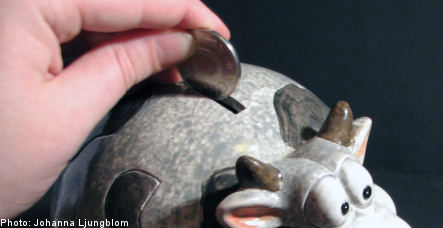Sweden, like most other western countries, has a system to protect depositors if a bank fails. As of October 6th 2008, the first 500,000 kronor is protected, but the system is complex. Here, we answer the main questions.
What’s the likelihood of a Swedish bank going bust?
No Swedish bank has so far collapsed following the onset of the world financial crisis. Swedish banks are generally perceived to be well-capitalized, although some observers have expressed concern about Swedbank, which has significant exposure to the faltering economies of the Baltic states. A $1.35 billion loan to failed investment bank Lehman Brothers has added to concerns about Swedbank’s future.
The authorities have insisted that the solvency of Swedish banks is not in doubt. Stefan Ingves, governor of the Riksbank, Sweden’s central bank, has said that Swedbank “has a good capital base, good profitability and very low loan losses, as is true for Swedish banks in general.”
It is also worth remembering that troubled banks in other countries have been nationalized or taken over by other banks rather than being allowed to fail. Indeed, Sweden has form on this question – during the bank crisis of the early 1990s, the Swedish government supported banks in return for equity. Nordbanken – now Nordea – was fully nationalized and the Swedish state retains a large stake in the bank to this day.
But what would happen to my money if a Swedish bank did collapse?
Like in other countries, a system is in place to guarantee savings up to a certain level. Banks pay fees to the Swedish Deposit Insurance Scheme (Insättningsgarantin), which then compensates savers who lose out if a bank goes bust. The Swedish fund is worth 17 billion kronor, which makes it larger in relative terms than any other similar fund.
The most obvious limitation to the scheme is that it only guarantees the first 500,000 kronor per person per bank (the amount guaranteed was raised on Monday from 250,000 kronor). This means that if you have more than this amount in the same bank you might not recover it from the state if the bank collapses.
What about savings accounts?
The increased guarantee introduced on October 6th 2008 covers all deposits in Swedish banks (the old guarantee excluded some savings accounts, but these are now covered).
I’ve got a mortgage in the same bank as my savings account. What then if the bank goes bust?
One difference between the Swedish scheme and similar schemes in other countries is that any mortgage debts are treated separately from savings. This means your debts will not be subtracted from any compensation, but will most likely be taken over by another institution.
How quickly would I receive my compensation?
Well, according to experience, pretty slowly. The scheme was put to the test in 2006, when the Custodia credit institute collapsed. In that case slightly fewer than 1,300 savers were hit, but many were left waiting more than six months to receive compensation from the state. Magnus Thor says Riksgälden, which only took over responsibility for the scheme in January, would usually pay out more quickly.
“The basic rule is that we will pay out within three months, although in a complex case it could take longer.”
I run a small company – what about my company’s money?
Company accounts are covered in exactly the same way as personal bank accounts. A company or association can claim back up to 500,000 kronor per bank.
What if the fund runs out of money?
Given the size of the Swedish fund, this is unlikely, but if there was no money left in the fund to pay the victims of a bank collapse, the government would step in to compensate savers.
The government has set up an inquiry to look at the state’s powers to intervene in a banking crisis. This is expected to lead to a bill clarifying the circumstances in which the government can take over a Swedish bank in financial trouble.
My money’s with a foreign bank. What happens then?
If you have money with a Swedish-incorporated subsidiary of a foreign bank, you are covered by the Swedish guarantee. If your deposits are held by a foreign bank, not via a Swedish subsidiary, your money may be covered by the deposit guarantees of that country, even if you opened the account via a Swedish branch office.
For instance, if you have money in Kaupting Edge (which is registered in Iceland) you are covered by the Icelandic deposit insurance. If you have money in Kaupting Sverige AB (a Swedish subsidiary of the Icelandic bank) you are covered by the Swedish guarantee.
If the money paid out by a foreign scheme is less than the 500,000 kronor guaranteed by Sweden, you may be entitled to claim the difference from Riksgälden.
How would I make my compensation claim?
The Swedish National Debt Office will contact all customers of any bank that collapses.



 Please whitelist us to continue reading.
Please whitelist us to continue reading.